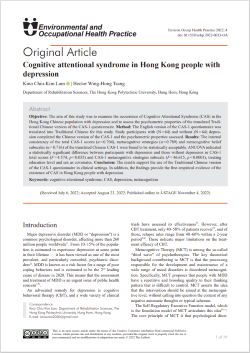#E0054 Cognitive attentional syndrome in Hong Kong people with depression

Addressing Cognitive Attentional Syndrome among Hong Kong Chinese People with Depression
Depression is among the most prevalent psychological disorders in the world, which affects an estimated 10-15% of the world’s population at some point in their lifetime. It is also considered a comorbidity and the cause of several diseases. Rise in the number of cases of depression have made this disorder a major public health concern that needs to be immediately addressed, assessed, and treated.
One of the new, effective approaches to treating depression is metacognitive therapy (MCT), which is built on the principle that psychological disorders like depression are linked to a specific toxic style of thinking known as “cognitive attentional syndrome” (CAS). CAS involves a repetitive and pervasive thinking pattern that entails worrying, excessive focusing on threats, and resorting to unhelpful coping mechanisms like avoidance, substance use, etc. To treat depression, it is, therefore, vital to understand the impact of CAS on the patient’s emotional regulation.
Hong Kong is known to have a high rate of depression that is only worsening with time. With the recent pandemic and rising personal and socio-economic burdens, it has become necessary to address depression in the region. To this end, researchers from the Hong Kong Polytechnic University have investigated the occurrence of CAS in the Hong Kong Chinese population with depression.
In their study, they used the CAS-1 questionnaire, a standard assessment tool for CAS, which they translated from English to Traditional Chinese. The team recruited 64 participants with depression and 64 healthy participants, all of whom completed the translated questionnaire. Their responses were then statistically analyzed, with the participants’ education and sex as covariates.
The analyses revealed that the depression group reported significantly higher mean CAS-1 total scores than the healthy group, and adopted more metacognitive strategies to deal with their depression. These responses positively correlated with depressive symptoms, such as ruminating, pathological worrying, and threat-monitoring.
The overall results of this study provide the first empirical proof for the occurrence of CAS among Chinese people with depression in Hong Kong. Further, it validates the effectivity of the Traditional Chinese version of the CAS-1 questionnaire and provides support for its use in clinical settings as a way to enable early interventions for both CAS and depression.

Link to original journal article:
https://www.jstage.jst.go.jp/article/eohp/4/1/4_2022-0013-OA/_article
Title of the paper:
Cognitive attentional syndrome in Hong Kong people with depression
Authors:
Kino Chiu-Kim Lam, Hector Wing-Hong Tsang




